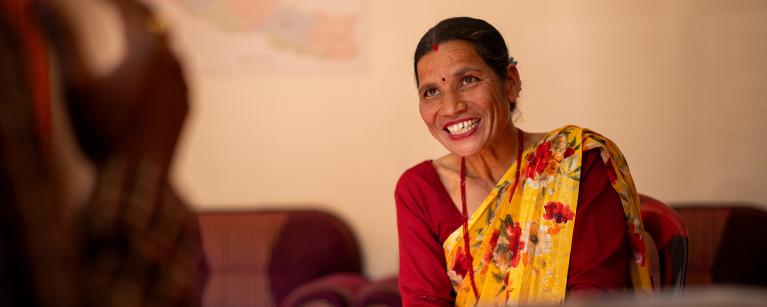The recently constructed narrow dirt road winding into Haldyaam in the mountainous region of western Nepal came at an unexpected price: It knocked out the supply of water serving the village.
“We desperately needed the road, but the construction ruined our water pipes,” explains Indra Devi Bhul, a 41-year-old farmer in Haldyaam. “For a time, we had to rely on the nearby river, a difficult burden.” She and her neighbors had to walk to the river (a 30-minute round trip) and carry water back for cooking and bathing, watering their vegetable gardens, and caring for their livestock.
Her representative in the local government, Pramila Bhul, took action to repair the water system. Her advocacy in Ward and Municipal meetings secured 300,000 NPR for repairs.
“Pramila made our concerns heard in the local government. She has brought back water in our pipes again,” shares Indra Devi Bhul.
The budget funded the replacement and underground installation of pipes, preventing further damage.
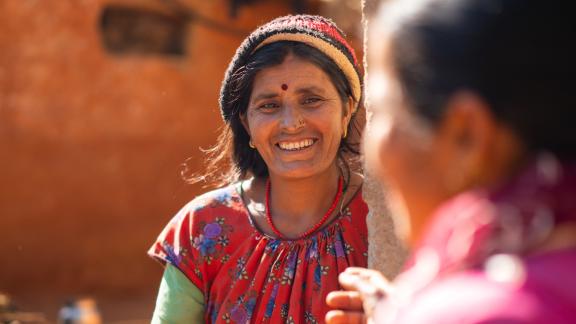
Pramila Bhul interacting with Indra Devi Bhul from Ganyapdhura RM-3, Dadeldhura district. Photo: Rashik Maharjan/Oxfam
Doing good work
Pramila Devi Bhul is a Ward Member of Ganyapdhura Rural Municipality-3 in Dadeldhura district of Sudurpashchim Province in far western Nepal. It’s a place remote enough that when visitors arrive by car they have trouble navigating the new dirt road full of livestock. Children come from their homes to guide animals away off the road; cars are a rare sight, so they are also curious.
"We re-elected her because of her good work," Indra says of her neighbor Pramila Bhul.
Pramila Bhul is a petite woman of 37 years, soft spoken but always willing to be vocal about issues important to her community and close to her heart. Her leadership aspirations were rooted in her childhood. Witnessing her father's role as a community figure, with people seeking his assistance and listening to his public speeches, ignited her own desire to become a leader.
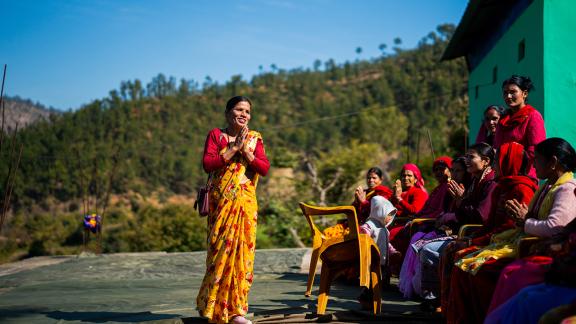
Pramila Bhul, 37-year-old Ward Member from Ganyapdhura RM-3, Dadeldhura district interacting with women at a Cooperative meeting. Photo: Rashik Maharjan/Oxfam
“However, my dream was long forgotten as I married young and was soon overwhelmed by household responsibilities including raising my two children,” recounts Pramila.
After marriage she was involved in agriculture, a primary source of livelihood in rural Nepal. In her community, most farmers grow rice and wheat, but it is a dry and hilly region, posing many challenges for farmers.
As her days got busy taking care of her family and farming a small plot of land, she got involved with the Sayapatri Female Small Farmer Cooperative, starting as a member and then later rising to the ranks of Treasurer. She believes it was her role as a Treasurer for the cooperative that got her noticed in the community.
For the local elections in 2017, she was approached to take on the position of a Ward Member representing the Dalit minority in the community. Dalit people occupy the lowest rung in traditional South Asian hierarchy, and have been historically subjected to widespread discrimination and social exclusion. Pramila Bhul was skeptical about taking on this role, but her husband encouraged her to accept the post. She became an uncontested Dalit Ward Member for Ward No. 3 of Ganyapdhura Municipality for the first time in 2017.
“At the time, my children were young, and I feared the responsibility I was being given. However, my husband and family were supportive. They stepped in to relieve me of household duties so I could focus on my public life,” shares Pramila.
Pramila’s husband, Govind Bhul, works as a teacher at a private school nearby. He now shares the burden of domestic responsibilities for their family. “I take care of household chores including looking after our daughter when Pramila is busy and must attend meetings. Our entire family including my mother and father support my wife’s role,” he says. “I ask her to attend all the meetings as I believe they help her learn and grow as an individual and as a leader.”
Learning the skills to be a leader
“During my first tenure, I had limited knowledge and skills,” Pramila says. “I was often referred to as a ‘Dalit member.’ The decision making was dominated by male leaders and women were confined to ceremonial or membership positions. I did not have the knowledge to make substantial contributions or articulate the community’s demands. I did not know the process and I was not confident in public speaking.”
It was towards the end of this tenure that Pramila got associated with Women’s Leadership Platform, Oxfam’s approach to empowering women leaders in Nepal. The platform engages in various discussions on social, economic, and political issues affecting women leaders.
Pramila participated in several training sessions, including leadership training, public speaking skills, gender-based violence and government policies aimed at eliminating violence against women, the local-level planning process, proposal writing, and budget planning. She learned about women's rights, women's political rights, leadership, and government policies to ensure women's rights.
Pramila was successful in earning the goodwill of the people in her community during her first tenure as Ward Member as she successfully allocated budget of NPR 400,000 for tailoring training for 18 women in the ward. Besides the training, the women were also provided with sewing machines.
Following Pramila's re-election as Ward Member, three of the eighteen women, who expressed interest in opening shops, received advanced training. Reshma Kumari Nepali, one of the recipients, has since established a tailoring shop near the main road. “The training and sewing machine provided by the Ward are my primary income source. They even invested in repairing my shop's roof,” Reshma shares.
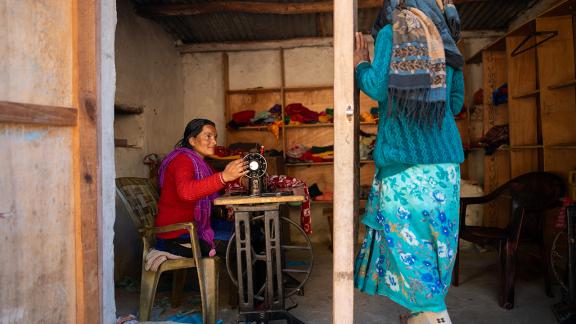
Reshma Nepali working at her tailoring shop in Ganyapdhura RM-3, Dadeldhura district. Photo: Rashik Maharjan/Oxfam
Working with women in the community and learning about the ways local government can help them has led Pramila to engage with her constituents, personally visiting people in their village and sharing information about training programs, subsidies for Dalit farmers, scholarships for students, and generally raising awareness about resources available to citizens.
This humble approach to service has endeared her to her community and led to Pramila’s re-election as a Ward Member following local level elections in 2022 despite being contested by two other leaders. She also got elected to Municipality level Executive Committee, which has provided her access to attend budget allocation meetings and ensure her voice is heard during the planning process.
Support for farmers
In rural Nepal, seasonal male migration for work abroad makes agriculture primarily a woman's responsibility. Due to their care work burden, women primarily participate in small-scale, less time-intensive farming practices.
Harvests were inadequate in this dry, hilly area, with only one planting season possible after the rains, until the Ward introduced a water lifting irrigation system.
The river, though close, was useless for irrigation due to the lack of channels. Carrying water from the river uphill to the farmland was unfeasible. Fields remained barren, and residents had no choice but to wait for the monsoon's initial rainfall to begin their planting cycle.
Pramila Bhul successfully lobbied for allocation of NPR 700,000 budget for an irrigation system that pumps water up from the river to nearby fields, storing it in a cement water tank. The new irrigation system ensures that her people can cultivate wheat, mustard, and rice even during the dry season.
“Before, we had to wait for the monsoon rains to begin planting,” says farmer Bimala Deuba. “Now, the river's water lifting system allows us to plant crops throughout the year. As you can see, our wheat fields are thriving even in this dry season.”
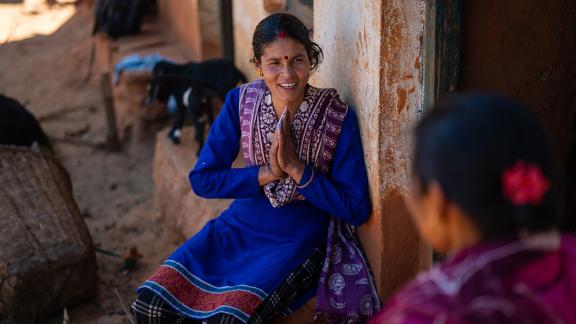
Pramila Bhul interacting with Bimala Deuba, a farmer from Ganyapdhura RM-3, Dadeldhura district. Photo: Rashik Maharjan/Oxfam
“The difference is significant. We no longer have to buy food because our harvests last the year. We value Pramila's leadership on this.”
The residents express their appreciation for Pramila's contributions to their well-being, as do the other elected representatives.
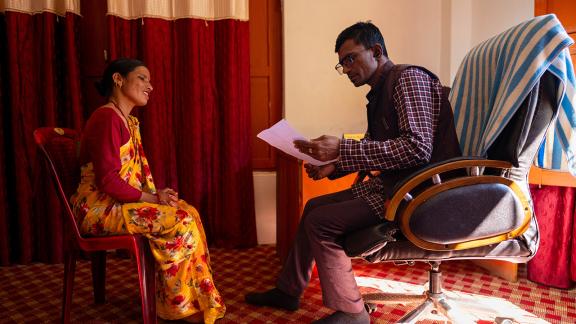
Chakra Bahadur Deuba, Ward Chairperson and Pramila Bhul, Ward Member of Ganyapdhura RM-3, Dadeldhura district in a meeting. Photo: Rashik Maharjan/Oxfam
“The fact that only Pramila and I were re-elected speaks to the people's confidence. Her deep understanding of local governance, particularly planning and budgeting, has been a significant asset. Her presence in the Municipal Executive Committee doubles our influence, allowing us to effectively advocate for our demands,” offers Chakra Bahadur Deuba, Ward Chairperson.
Pramila hopes to continue serving her people while nurturing another dream of being elected as a Ward Chairperson.
“I hope to keep serving my people. I want to be elected to more decision-making roles so I can better serve the people,” smiles Pramila.
This story is written by Rachana Mukhia/Oxfam in Nepal and edited by Chris Hufstader/Oxfam America.
